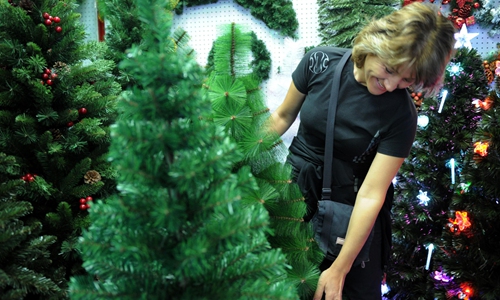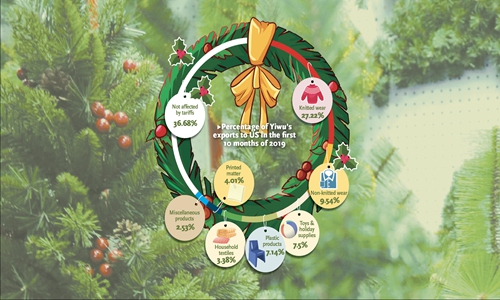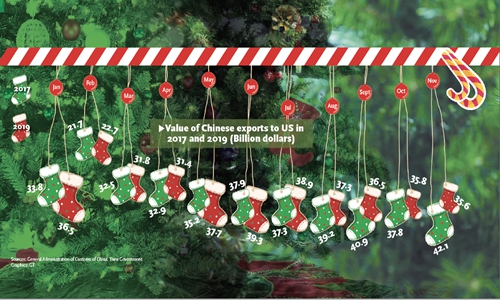A Christmas ‘made’ in China
Manufacturing hub paints mixed picture of world economy amid trade war

A foreign buyer checks Christmas products in Yiwu, China. Photo: CNS Photo
As many parts of the world from the US to Europe are gearing up for one of the biggest holidays of the year, many might not realize that a merry Christmas in this day and age could be impossible without the labor of millions of Chinese factory workers.
From Christmas decorations to utensils to gifts, most of the essentials for Christmas celebrations are made in China, particularly in the manufacturing hub of Yiwu in East China's Zhejiang Province. According to some estimates, 80 percent of the world's Christmas products are made in China, and 80 percent of the national total is made in Yiwu.
Just as the Christmas is for many a moment of reflection over their lives in the past year, Yiwu's production lines could also provide a reckoning of the state of the world economy. The changes seen by businesses in Yiwu paint a mixed picture of the Chinese and world economies.
While some businesses have been hit hard by tariffs and slowing global growth, there are also positive signs of China's economic resilience.

Can't avoid Made-in-China
Despite steep rises in tariffs, many US consumers can't find alternatives for China-made products that are essential for the holidays, at least for the moment, as buyers are willing to pay extra, according to some businesses in Yiwu.
"Our company's Christmas orders even increased from the sales recorded in 2018 and they were finished in August," said Yang Zhiwei, general manager of Yibing Import and Export Co, which focuses on decorations and accessories.
Yang said that sales in 2019 could reach 10 million yuan ($1.42 million), up 400 percent from last year, and half of that will come from the US.
In spite of the US additional tariffs, exports of goods targeted by US tariffs saw a significant increase in the first 10 months of 2019, with exports of plastics and related products rising about 41 percent year-on-year and exports of holiday goods increasing nearly 39 percent, according to the Yiwu government report.
The increase shows that there is no alternative to Chinese products for US consumers and that US buyers pay for the tariffs, not Chinese companies, unlike what some US officials have suggested, according to businesses.
A vendor of plush toys, who declined to be identified, told the Global Times that plush toys are must-have items for Christmas gifts and the amount of orders saw a slight increase this year. "US consumers pay for it, with or without tariffs," he said.
Factories in Yiwu have also seen expansion in exports to other countries and regions, some of which could be rerouted to the US, some businesses say.
"I have learned that some US buyers imported from Southeast Asia or from Mexico to avoid the US tariffs on Chinese exports. But for the majority of US buyers, no matter where you buy, you are buying made-in-Yiwu products," said Chen Peng, general manager of Yiwu Xingsu Supply Chain Management Co, which delivers seven to eight containers of manufactured goods each month to places such as India, Southeast Asia, Africa and South America.

Negative impact
However, some traders have also seen their businesses hit hard by not just punitive tariffs imposed by the US but also a slowing global economy, due in no small part to the US' trade wars with major economies.
Yanxue Cosmetics said its orders from the US dropped by 50 percent due to US tariffs so far this year. "In 2018, we had to work overtime to keep up with orders, but this year everyone can leave on time," the company told the Global Times.
Nearly 27 percent of Yiwu's total exports to the US have been subject to additional US tariffs imposed by Trump ogvernment and nearly all products would have been targeted, if the US had not canceled a new batch of tariffs planned for December 15, according to a report by the Yiwu government shared with the Global Times on Monday.
The US did not impose the tariffs on everything from toys to electronics after Chinese and US officials agreed on the text of a phase one trade agreement in December. The two sides are still finalizing the highly anticipated deal.
The Yiwu government report said that garment factories have been among the hardest hit by US tariffs. Between August and October, nearly half of the city's clothing factories that export to the US reported a year-on-year decline of about 20 percent in orders, it showed.
While some businesses blame the US tariffs for declining orders, many point to the slowing world economy as the chief reason for their troubles.
"How bad is business? The sales of lucky cats are down 20 percent," a shopkeeper, who exports the popular figurine, told the Global Times on Monday. "With the whole world's economy sliding into a in recession, how we can sell the products?"